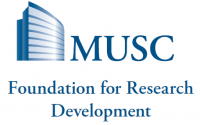MUSC first in state to receive advanced stroke certification
April 4, 2016Joint Commission, American Heart/Stroke Association recognize complex care providers
The Medical University of South Carolina has been recognized by The Joint Commission and the American Heart Association/American Stroke Association as meeting The Joint Commission’s standards for Disease-Specific Care Comprehensive Stroke Center Certification. The first hospital in South Carolina to receive this certification, MUSC is part of an elite group of 100 stroke care centers nationwide focused on complex stroke care. Complex Stroke Centers are recognized as industry leaders and are responsible for setting the national agenda in highly-specialized stroke care.
“Earning comprehensive certification speaks to MUSC’s commitment to stroke patients in South Carolina,” said Christine Holmstedt, M.D., co-director of the MUSC Comprehensive Stroke & Cerebrovascular Center. “We have all of the critical components to handle the most complex of stroke patients and provide the most advanced level of care achievable.”
Comprehensive Stroke Center Certification recognizes those hospitals that have state-of-the-art infrastructure, staff and training to receive and treat patients with the most complex strokes. MUSC underwent a rigorous onsite review in 2015. Joint Commission experts reviewed MUSC’s compliance with the Comprehensive Stroke Center standards and requirements, including advanced imaging capabilities, 24/7 availability of specialized treatments, and staff with the unique education and competencies to care for complex stroke patients.
“By achieving this advanced certification, MUSC has thoroughly demonstrated the greatest level of commitment to the care of its patients with a complex stroke condition,” said Mark R. Chassin, M.D., The Joint Commission president. “Certification is a voluntary process and The Joint
Commission commends MUSC for successfully undertaking this challenge to elevate the standard of its care for the community it serves.”
Comprehensive Stroke Center Certification was developed in collaboration with the American Heart Association/American Stroke Association and derived from the Brain Attack Coalition’s “Recommendations for Comprehensive Stroke Centers,”(Stroke, 2005), and“Metrics for Measuring Quality of Care in Comprehensive Stroke Centers,” (Stroke, 2011),and on recommendations from a multidisciplinary advisory panel of experts in complex stroke care.
“The American Heart Association/American Stroke Association congratulates MUSC on its Comprehensive Stroke Center Certification,” said Mark J. Alberts, M.D., American Heart Association/American Stroke Association spokesperson and incoming vice-chair of neurology and neurotherapeutics at UT Southwestern Medical Center. “Comprehensive Stroke Centers offer a high level of care for patients with the most severe and challenging types of strokes and cerebrovascular disease.”
Bruce Ovbiagele, M.D., MUSC chairman of neurology, said, “We have been providing this type of high-level stroke care for a while. This recognition from the Joint Commission will make awareness of our profound stroke expertise much better known in the state, thereby allowing more patients to benefit from disability-preventing and life-saving therapies.” To read more about MUSC’s comprehenisve stroke program, visit http://
For more information on The Joint Commission and American Heart Association’s Advanced Certification for Comprehensive Stroke Center, visit http://www.jointcommission.
About MUSC
Founded in 1824 in Charleston, The Medical University of South Carolina is the oldest medical school in the South. Today, MUSC continues the tradition of excellence in education, research, and patient care. MUSC educates and trains more than 3,000 students and residents, and has nearly 13,000 employees, including approximately 1,500 faculty members. As the largest non-federal employer in Charleston, the university and its affiliates have collective annual budgets in excess of $2.2 billion. MUSC operates a 750-bed medical center, which includes a nationally recognized Children’s Hospital, the Ashley River Tower (cardiovascular, digestive disease, and surgical oncology), Hollings Cancer Center (a National Cancer Institute-designated center) Level I Trauma Center, and Institute of Psychiatry. For more information on academic programs or clinical services, visit musc.edu. For more information on hospital patient services, visit muschealth.org.
About The Joint Commission
Founded in 1951, The Joint Commission seeks to continuously improve health care for the public, in collaboration with other stakeholders, by evaluating health care organizations and inspiring them to excel in providing safe and effective care of the highest quality and value. The Joint Commission evaluates and accredits more than 20,000 health care organizations and programs in the United States, including more than 10,600 hospitals and home care organizations, and more than 6,600 other health care organizations that provide long term care, behavioral health care, laboratory and ambulatory care services. The Joint Commission also certifies more than 2,400 disease-specific care programs such as stroke, heart failure, joint replacement and stroke rehabilitation, and 400 health care staffing services. An independent, not-for-profit organization, The Joint Commission is the nation’s oldest and largest standards-setting and accrediting body in health care. Learn more about The Joint Commission at www.jointcommission.org.
About the American Heart Association/American Stroke Association
The American Heart Association/American Stroke Association is devoted to saving people from heart disease and stroke – America’s No. 1 and No. 3 killers. We team with millions of volunteers to fund innovative research, fight for stronger public health policies, and provide lifesaving tools and information to prevent and treat these diseases. The Dallas-based association is the nation’s oldest and largest voluntary organization dedicated to fighting heart disease and stroke. To learn more or to get involved, call 1-800-AHA-USA1, visit www.heart.org or call any of our offices around the country. The familiar Heart-Check mark now helps consumers evaluate their choices in hospital care. Each mark given to a hospital is earned by meeting specific standards for the care of patients with heart disease and/or stroke. The Heart-Check mark can only be displayed by hospitals that have achieved and defined requirements set by the American Heart Association/American Stroke Association. For more information on the American Heart Association/American Stroke Association Hospital Accreditation Program visit www.heart.org/myhospitals.













